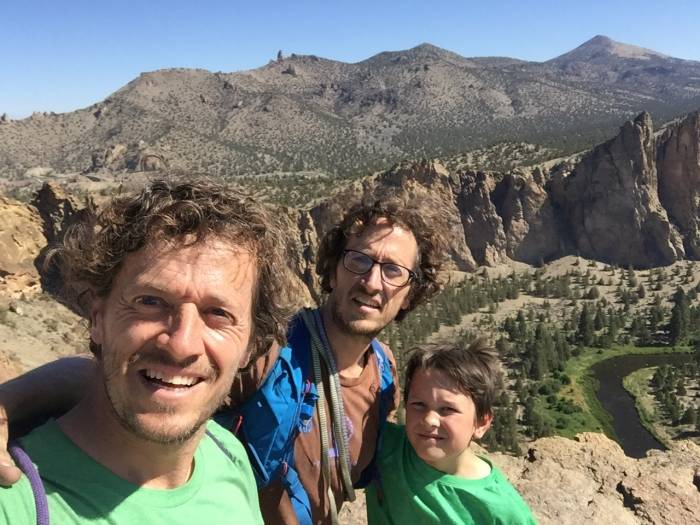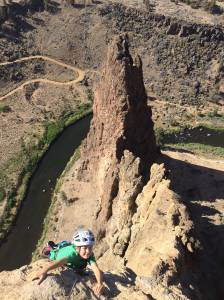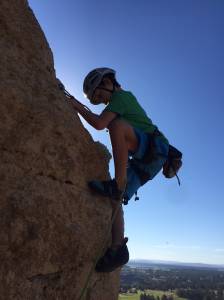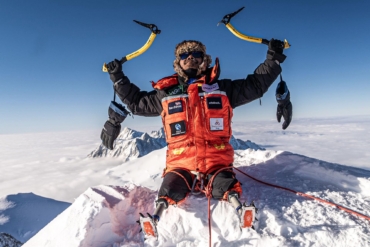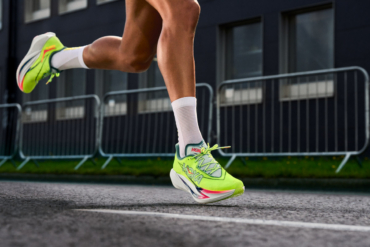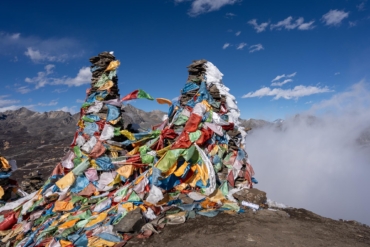Ready to take your child on a multipitch adventure? Our contributor breaks down a few tips to make climbing with kids safe and easy.
Kids are climbing more than ever. From urban gyms to afterschool programs, summer camps, and Scout badges, climbing is now a mainstream sport for many youths.
Most diehard climber parents I know wonder how to transition that 6- to 12-year-old kid’s enthusiasm into love for outdoor climbing, and even multipitch routes. It’s possible, but without some calculated thought, it often seems to backfire and push the kid farther into the confines of the local gym.
Over my years as a climber, I’ve been part of the process for many kids’ transitions from the gym to multipitch — and not all of them ended in success. My twin brother (and 20-year climbing partner) recently visited from New Zealand, and I got a chance to help turn his 10-year-old son’s focus toward the bigger stone.
There was the added pressure of my brother really wanting it to work — so we thought long and hard about how to guide AJ through the process.
Tips for Rock Climbing With Children
It might seem obvious, but we have to say it: You need to be an experienced climber yourself before taking out others, especially children. The advice below is for experienced adult rock climbers who’d like to teach their kids. Be smart and use at your own risk.
Adult-to-Kid Ratio
It might seem tempting to try to take several kids at once, but we suggest having a 2:1 ratio. This ensures there is always an adult at the belay stances to answer questions and double-check everything. And if at all possible, have one of those adults be someone who is not a direct parent or caretaker.
We all have different relationships with our primary caregivers. Often, it’s much easier for a kid to learn (i.e., accept instruction) from a friend rather than mom or dad.
Safety Gear 
Even if the specific route doesn’t warrant it, practice climbing the way you want your kid to remember it. Wear a helmet even if you normally wouldn’t, verbally double-check everything “on belay, belay on, etc.,” and make everything redundant.
Consider taking a few extra lockers for the anchor to make every carabiner connection in the system a locker. It’s a great visual for your kid to see locking carabiners in use and realize how important they are.
Give them their own PAS and make them use it, as well as tie into the rope, themselves. Make them double-check themselves and the leader adult before they climb.
The experience is not only about having a successful first multipitch but building simple patterns that will keep them safe in the future. It’s always easier to discuss exceptions to safety rules later as they progress into different situations.
Know the Route
This might seem obvious, but you must have the route dialed in before you take your child multipitching for the first time. Make sure you know the exit plan in case fear forces a retreat.
Many kids won’t know they have a debilitating fear of exposure until they face it. And a kid that can climb 5.11 in the gym might find a 5.8 nearly impossible when forced to deal with fear. Furthermore, picking out where the holds are in the gym is easy compared to reading the multifaceted rock far off the deck.
Look for a route with decent belay ledges. This is more important than easy climbing, as this is where the kid will spend the most time, and where they will be looking around. It takes a long time for most adults to get comfortable on a hanging belay, trusting their life to a small sling clipped in. So ensuring your kid’s comfort and safety the first few times is a must.
Route Length
Three to four pitches is ideal. Two is too short, as there is no repetition, which is so important for learning. More than four becomes very tiring for most youngsters, and they start to lose their gusto. Remember to factor in the hike in and out too.
Go to the top of something: Sense of achievement is important, so choose a first climb that actually tops out on a peak or feature. It’s amazing to be able to point to something and say, “We climbed that!”
We feel it harkens back to the early days of climbing when most climbs had a goal of a summit or cresting the top of a cliff. It instantly resonates with most kids.
We’ve found that an easier climb that tops out is far more memorable in the early days of multipitch progression than a more technical climb that ends a few pitches up in the middle of a cliff. As we discussed earlier, being able to hike down eliminates the need to teach multipitch rappelling and allows the youngster to focus on the climbing techniques. Plus, the hike down is a good time to reflect on the journey to the top.
On the Move
After all the prep and planning, it’s equally important to plan out the details of the actual climb.
One adult goes first, leading the pitch. If you’re at all hesitant, don’t lead. Send the stronger climber so there won’t be any falls or struggle as the kid watches. (Following the above recommended 2:1 adult-to-kid ratio, you should have at least one other adult with you.)
There’s nothing more debilitating if you’re nervous than watching someone else go first and make it seem hard. If the leading adult is scared and shows it, chances are the kid will be too. It can be also encouraging for the kid if the leader sprinkles in positive phrases like “sweet holds up here,” “this part feels just like gym climbing,” and “wow, that move was so fun!”
Once the leader is up to the anchor, belay the child climber from both the top and the bottom as they climb. They’ll unclip the upper rope from the quickdraw, and reclip it below, essentially practicing leading.
This complexity may be too much for some kids, but it may also make them focus on something other than fear. Many kids I’ve taken on their first climb have loved the idea of practicing for a real lead someday.
And the added safety bonus of this double belay is that any traverse moves are safe from the dreaded pendulum fall if the route meanders like ours did. The second adult double-checks all the safety; acts as a coach, cheerleader, and photographer; and climbs last.
Take Pictures
Truth be told, I’m not an Instagram or Facebook fan, especially when kids are involved. But I do think that taking a few pictures to show to those who weren’t there is a must. It gives them a chance to share the feat with others and get excited to do it again.
Whether or not you’re helping to create the next Sasha DiGiulian or Alex Honnold, your kids will likely enjoy looking back on those photos and showing them to their own kids before their first climb.
Food and Treats
Take your favorite wall climbing junk food and share it with your kids. I’m all for keeping kids eating well as they grow up, but there’s something special about sharing treats at belay ledge a few hundred feet off the deck. We shared gummy snacks and Snickers minis with AJ before the final pitch, topping it off with a decadent breakfast burrito once we reached our goal.
We also carried both water and Tailwind (a sugary sports drink) to make sure he stayed hydrated for the hot hike out. The actual food is less important than the act of sharing something special with your young partner, as the food can become a positive metaphor for the climb itself.
Framing Success
Frame the whole experience in a way that starts to create the next generation of environmental stewards. Instead of saying, “Good job, you conquered that mountain,” consider something more like, “It was amazing to experience that vertical realm with you.”
Steering your kids early to think of outdoor sports in a less adversarial way and more in a communal, cooperative way creates outdoor athletes who enjoy climbing whether they make it to the top or not.

